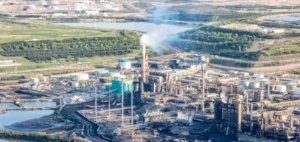U.S. oil and gas giants ExxonMobil and Chevron saw their profits swell in the first quarter despite lower energy prices, thanks in part to their refining operations and cost-saving measures.
ExxonMobil did particularly well: its net income more than doubled compared to the same period in 2022 to $11.4 billion, a record for a first quarter. Chevron’s net profit rose by 5% to $6.6 billion.
Profits of the world’s major energy companies soared to record levels last year, boosted by soaring crude and gas prices in the wake of the war in Ukraine. The price of black gold listed in New York, which had climbed above the 100 dollar mark in March 2022, has since fallen back due to the economic slowdown and is currently between 70 and 80 dollars.
ExxonMobil’s total revenues fell by 4% to $86.6 billion. Chevron’s by 7% to $50.8 billion. But ExxonMobil has produced more: 3.8 million barrels per day of oil equivalent, 160,000 barrels more than in 2022, with new projects in Guyana and the Permian Basin in the United States.
At the same time, the company sold more processed hydrocarbons, benefiting from higher refining margins. In particular, it benefited from the start-up of the expansion of its Beaumont refinery on the Gulf Coast, which allows it to process 250,000 more barrels each day. The company, however, sold fewer chemicals and at lower margins.
Demand in China
ExxonMobil “is increasing its value by increasing production in its most advantageous projects to meet global demand,” noted its boss, Darren Woods. A key consideration going forward will be the extent to which demand increases in China as the country emerges from health restrictions, he noted in an interview on CNBC.
In a “tense” market, “there are not many levers to pull on production,” he said. At the same time, his group is continuing to implement its cost reduction plan, which calls for savings of around $9 billion per year by the end of 2023 compared to 2019.
The company was hit at the beginning of the pandemic by the drop in energy prices, and had embarked on a major program to cut expenses. It has since benefited from the sharp rebound in oil and gas prices. The jump in its net profit is also linked to the fact that it had recorded a heavy charge over the same period in 2022 linked to its departure from a major project in Russia.
Chevron extracted less hydrocarbons (-3%), mainly due to the end of a concession in Thailand. But the group also says it has benefited from “higher margins on sales of refined products”.
On the other side of the Atlantic, TotalEnergies also reported on Thursday an increase in net profit, up 12% to $5.6 billion, despite a drop in revenue.
Italian oil and gas giant Eni, on the other hand, reported on Friday that it saw its net profit fall by 33% in the first quarter. Both ExxonMobil and Chevron recorded charges of $200 million and $130 million, respectively, for additional energy taxes in Europe. They also rewarded their shareholders handsomely, with ExxonMobil paying them a total of $8.1 billion and Chevron $6.6 billion.
Both companies also assured that they were using a portion of their profits to invest in carbon emission reduction, including carbon capture and storage projects. ExxonMobil shares were up 1.5% in early trading on the New York Stock Exchange, while Chevron shares were down 0.7%.





















